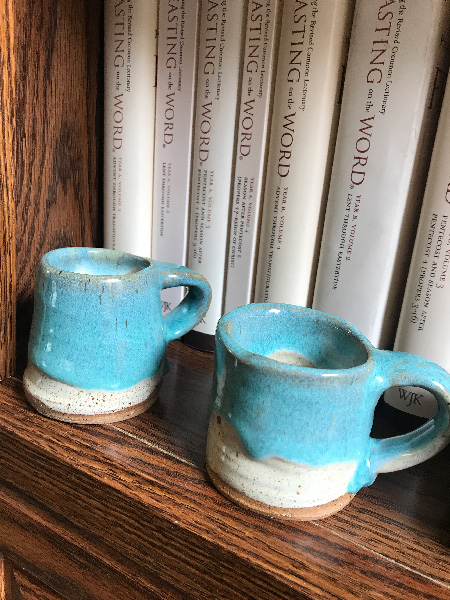
By Rev. Alexandra Mauney, Sid & Cathy Batts Pastoral Resident
The summer before I was ordained and began my work here, I worked at Montreat Conference Center. Those summer months of 2019 became a time of holy rest for me as I prepared to enter the wilderness of full-time pastoral ministry. I spent my days teaching devotions to children and ministering to college staffers, and I spent my evenings and early mornings cruising the Blue Ridge Parkway looking for short hikes.
The greatest unexpected joy of my summer was the free, 24/7 access to the conference center’s pottery studio. I was determined to learn how to create beautiful pottery. I had dreams of crafting Communion sets for colleagues who were soon to be ordained, butter dishes for my family matriarchs, and wine tumblers for my significant other’s new home.

An example of Alexandra’s pottery.
As anyone who has been a new student of pottery knows, dreams like these are great until you actually start learning to throw on a pottery wheel. I soon lowered my expectations and settled for the goal of crafting a couple mediocre bowls by the end of my summer in the mountains. With the help of some patient teachers and fellow potters, I did come into my first ministry call with a few misshapen bowls of various sizes for my new apartment.
As it turns out, the lessons of those summer months at the pottery wheel reached far beyond my skills at a new craft. At the risk of sounding like a preacher searching too hard for a sermon illustration, my time working with clay has taught me countless lessons about life and ministry. These lessons are far-reaching, and every potter knows that much ink has been spilled relating the experience of creating pottery to the famous Jeremiah 18 image of God as master potter.
But the big lesson for me has been the holiness of skills like adaptability and flexibility. These skills are not at the top of my list of strong personal attributes; when I underwent a mandatory psychological examination during my ordination process, I ended up farther on the “Very Inflexible” end of the “Flexibility” continuum than I usually care to admit. Learning pottery has been an exercise in adaptability.
I joined a local pottery studio when I moved to Greensboro at the end of the summer, and my weekly trips to the studio continue to poke and prod at my sense of imagination and resilience. Last week, I retrieved a near-perfect cylinder from the drying rack, which I intended to trim and place in the kiln room. I was very proud: It was the closest thing to a professional-looking piece that I’d ever made.
Somehow, on the way from the rack to the wheel, I dropped the piece and ruined the cylindrical form. The rim was still nearly perfect, but the bottom was a mess. I let out the “potter’s groan,” and all the potters around me commiserated. We’ve all been there. You lose a piece, toss it in the clay recycling bucket, and start again. But our instructor had some different advice: “It’s really kind of interesting now, isn’t it? Why don’t you go ahead and stick it in the kiln room and just see how it turns out?” I didn’t particularly want to memorialize this moment of clumsiness in my burgeoning craft, but I took the instructor’s advice. I fired the odd piece, glazed it, and now it sits on my office shelf, a reminder of the beautiful and holy work of flexibility.
I have been a pastor for only a few months, but I am regularly astounded by the kinds of flexibility into which I am invited throughout my weekly tasks.
- Ushers can’t find the worship bulletins and I still don’t know my way around our enormous church campus? No problem; let’s go search for them together.
- Church members feel untethered during this period of pastoral leadership transition? Ok, let’s think about how we might honor beloved traditions and practices while adapting them to meet new generations of leadership.
- Worship leaders aren’t sure how to divide duties associated with changes in our Sunday morning liturgical patterns? Great, let’s see how we can all pitch in to support the work of our exciting new liturgical life together.
I am reminded again and again of the pottery wheel when I deal with the adaptive challenges of ministry in the 21st century. Just as my instructor encouraged me not to give up on a piece that turned out a bit different than I imagined, I have to encourage myself not to give up on whatever predicament presents itself on a given day.
I learn all the time, both at the studio and at the church, and this unique season has brought such surprising confluence between the learning that happens in these very different areas of my life. My handmade bowls adorn my office space, and I occasionally stop by the studio with my clergy collar on. And even as we all struggle together in the work of ministry and life, I give thanks for the cultivation of holy flexibility.
